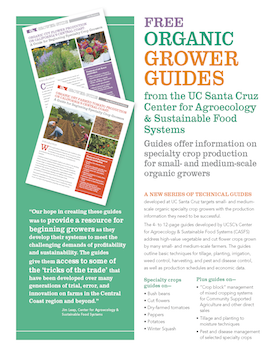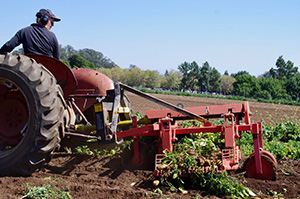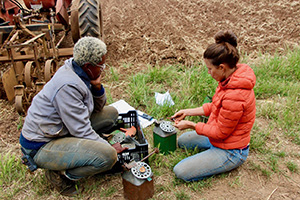A new series of technical guides developed at UC Santa Cruz targets small- and medium-scale organic specialty crop growers with the production information they need to be successful.
The 4- to 12-page guides developed by UCSC’s Center for Agroecology & Sustainable Food Systems (CASFS) address high-value vegetable and cut flower crops grown by many small- and medium-scale farmers. The guides outline basic techniques for tillage, planting, irrigation, weed control, harvesting, and pest and disease control, as well as production schedules and economic data.
“Farming on a small scale using mechanization requires a tremendous amount of skill, innovation, and knowledge, not only to maintain profitability and minimize labor inputs, but also to manage the soil well,” said Jim Leap, a long-time organic grower and farmer educator who served as lead writer on many of the new guides.
“Our hope in creating these guides was to provide a resource for beginning growers as they develop their systems to meet the challenging demands of profitability and sustainability. The guides give them access to some of the ‘tricks of the trade’ that have been developed over many generations of trial, error, and innovation on farms in the Central Coast region and beyond.”
Six of the guides cover a single crop topic: bush beans, cut flowers, dry-farmed tomatoes, peppers, potatoes, and winter squash. Another addresses how to manage “production blocks” of diverse crops for Community Supported Agriculture (CSA) projects and other direct marketing efforts. Two of the guides offer information for use across many crops, including a short guide to tillage and “planting to moisture” techniques that help conserve water and minimize weed growth, and a guide to pest and disease management for crops covered in the other guides.
Detailed graphics outline the annual sequence of steps involved in growing each crop, and economic data provide details on the cost of materials, labor, and tractor time, as well as yield and income.
“Whether you are training new farmers or one yourself, these guides will give you a handy condensed wealth of knowledge in a practical format. Having numbers to calculate possible estimated costs and potential revenue is a valuable feature of these guides as well, often missed by growing guides,” said Adrian Fischer member and public outreach specialist for California Certified Organic Farmers.
The Grower Guides are based on organic production practices used at the 30-acre organic farm and 3-acre garden at UC Santa Cruz, and although the techniques described— especially those that focus on water conservation—are particularly relevant to growers in California, many can be applied to any small- to medium-scale organic operation.
New series builds on UCSC’s training expertise
With more than 1,500 organic farmers trained through its Apprenticeship in Ecological Horticulture over the past 50 years, UC Santa Cruz has a strong track record of teaching specialty crop skills to new growers.
CASFS has also developed detailed curricula on how to teach organic farming and gardening, resources that are used around the world to train new organic farmers. The new Grower Guide series builds on these materials to help farmers facing the range of decisions needed to grow specialty crops successfully.
“The practitioners, educators, and editors at the UCSC Center for Agroecology and Sustainable Food Systems have done it again,” says professor Albie Miles, an expert in organic farmer education who recently launched the University of Hawai’i’s sustainable agriculture program.
“The guides combine clear and concise technical information with engaging graphics and illustrations. These publications make an important contribution to farmer training and technical education in the field of sustainable and organic agriculture,” he said.
Guides available online and in print
The Grower Guides series is available to download for free from the CASFS website. You’ll also find videos produced by CASFS on organic weed management, incorporating cover crops, and other field production topics.
For more information, or to request printed copies of the Grower Guides, please contact the Center for Agroecology & Sustainable Food Systems (CASFS) at casfs@ucsc.edu, 831-459-3240. Funding from the California Department of Food and Agriculture’s Specialty Crop Block Grant program supported development of the new guides.



